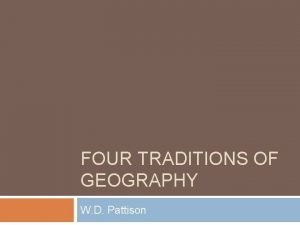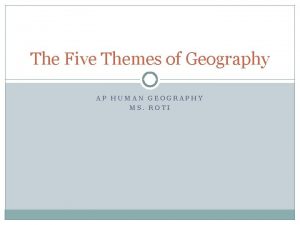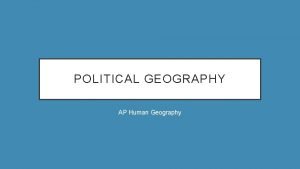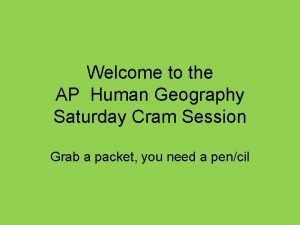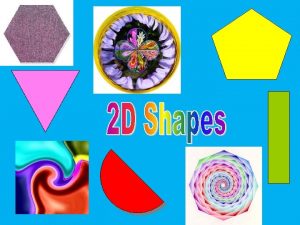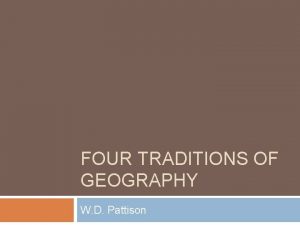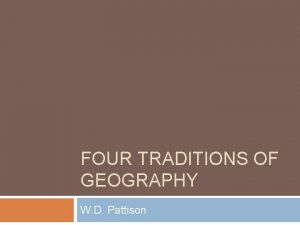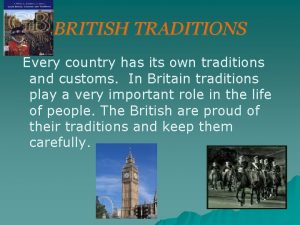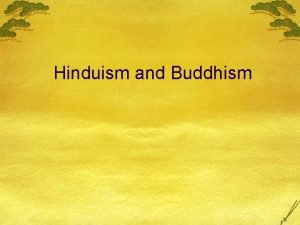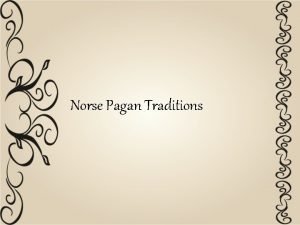FOUR TRADITIONS OF GEOGRAPHY W D Pattison W











- Slides: 11

FOUR TRADITIONS OF GEOGRAPHY W. D. Pattison

W. D. Pattison In 1964, W. D. Pattison, a professor at the University of Chicago, wanted to counter the idea that geography was an undisciplined science by saying that geographers had exhibited broad enough consistency such that there were four distinctive, but affiliated traditions.

Tradition One Spatial Tradition (also called Locational Tradition Some Core Concepts: Mapping, Spatial analysis, Boundaries and densities, Movement and transportation, Quantitative techniques and tools, such as computerized mapping and Geographic Information Systems (GIS), Central Place Theory, Areal distribution, and Spatial patterns In other words: NOT JUST WHERE THINGS ARE BUT OUR PERCEPTION OF WHERE THINGS ARE

Tradition One Modern geographer: Alfred Wegener; climatologist 1) Studied spatial arrangement of landmasses, used geographical and geological evidence 2) Continental drift – landmasses were once part of supercontinent (plate tectonics)

Tradition Two Area Studies Tradition (also called Local Tradition) Some Core Concepts Description of regions or areas, World regional geography, International trends and relationships, How regions are different from one another. Facts about a region: religion, language, race, climate, population, etc… Some geographers become experts on regions.

Tradition Two Modern geographer: Carl Sauer (1889 -1975); American 1) The work of human geography is to discern the relationships among social and physical phenomena 2) Everything in the landscape is interrelated.

Tradition Three Man-Land Tradition: (also called Human. Environmental, Human-Land, or Culture-Environment Tradition) Core Concepts: Human impact on nature, Impact of nature on humans, Natural hazards, Perception of environment, Environmentalism, and Cultural, political and population geography The relation ship between humans and the physical environment…most often taught in schools

Tradition Three Modern geographer(s): Alexander von Humboldt (1769 -1859) and Carl Ritter (1779 -1859); German 1) Move beyond describing earth’s surface to explaining why certain phenomena are present or absent. 2) Origin of “where” and “why” approach 3) Environmental determinism – how the physical environment causes social development

Tradition Four Earth Science Tradition Core Concepts: Physical geography: lithoshpere, hydrosphere, atmosphere, and bioshpere; Earth-sun interaction; Offshoots are geology, mineralogy, paleontology, glaciology, geomorphology and meteorology Study of the physical geography of earth and what shapes the earth (processes)

Tradition Four Modern geographer: Immanuel Kant (1724 -1804); German 1) All knowledge can be classified logically or physically 2) Descriptions according to time comprise history, descriptions according to place compromise geography 3) History studies phenomena that follow one another chronologically, whereas geography studies phenomena that are located beside one another.

What is Human Geography How do the 5 Themes of Geography connect with Pattison’s Four Traditions?
 Traditions in geography
Traditions in geography Frq format ap human geography
Frq format ap human geography 5 themes of geography ap human geography
5 themes of geography ap human geography Proruption ap human geography
Proruption ap human geography Elongated states
Elongated states Shapes with four sides and four corners
Shapes with four sides and four corners Four eyes skin assessment
Four eyes skin assessment Easter traditions in the uk
Easter traditions in the uk Funny australian christmas traditions
Funny australian christmas traditions Sicilian traditions and customs
Sicilian traditions and customs School traditions in belarus
School traditions in belarus Slovakia christmas carp
Slovakia christmas carp
